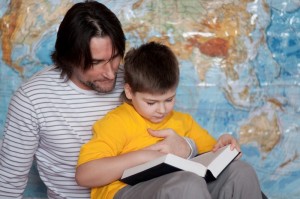Why travel with your kids? Because travelling with children prioritises the family over every other demand, writes Renee Krosch.
We’re so busy in the modern world. There are so many demands on our time. How often are you leaping from one job to the next like an Olympic hurdler?
Where is the time to just ‘be’ with yourself and your kids?
Travelling creates this opportunity.
The chance to sit quietly and simply listen to one another. To really get to know your children. For the young intrepid traveller it’s the bain of their existence, but for the travelling parent, the hours spent ‘waiting’ are a magnificent opportunity.
Waiting for planes or trains or museums to open are really an opportunity to just ‘be’ with your little people. To listen to them, to chat, to observe and get to know them.
Travelling with children prioritises the family over every other demand. And it’s this aspect of travelling that is the most valuable for a sense of connection and your child’s sense of worth.
Professor Bruce Robinson, leads The Fathering Project at the University of Western Australia.
“Travelling with kids has a number of advantages,” he says. “There’s educational opportunities, cultural exposure… but there is something extra special and that is, if people bother to spend time with their kids, the kids feel worthwhile. If there is one thing I could put into a pill and give to every kid, it would be the feeling that they’re worth something.
“If parents are busy but they spend time their kids, the kids think: my parents are busy and their spending time with me, I must be worth spending time with. They don’t say it, they just feel it.”
The Fathering Project has had some extraordinary findings.
“What’s been shown is that kids on average have an expectation that mum will love them and nurture them , but that dad’s are more variable,” says Professor Robinson. And kids have their have their radar out for whether dad bother’s with them or not.”
“Children who spent more time with their fathers during their transition to adolescence had better social skills and higher self-worth than those who spent less one-on-one time with their fathers. The same effect was not observed for mothers.”
“Children with distant, unsupportive and cold fathers were at a greater risk of developing a mental illness like depression, anxiety or bipolar disorder as an adult. They were twice as likely to have a substance abuse problem and 10 times as likely to be involved in crime.
Listen to the full interview here:
Renee Krosch is a mother of two and producer at 702 ABC Sydney.